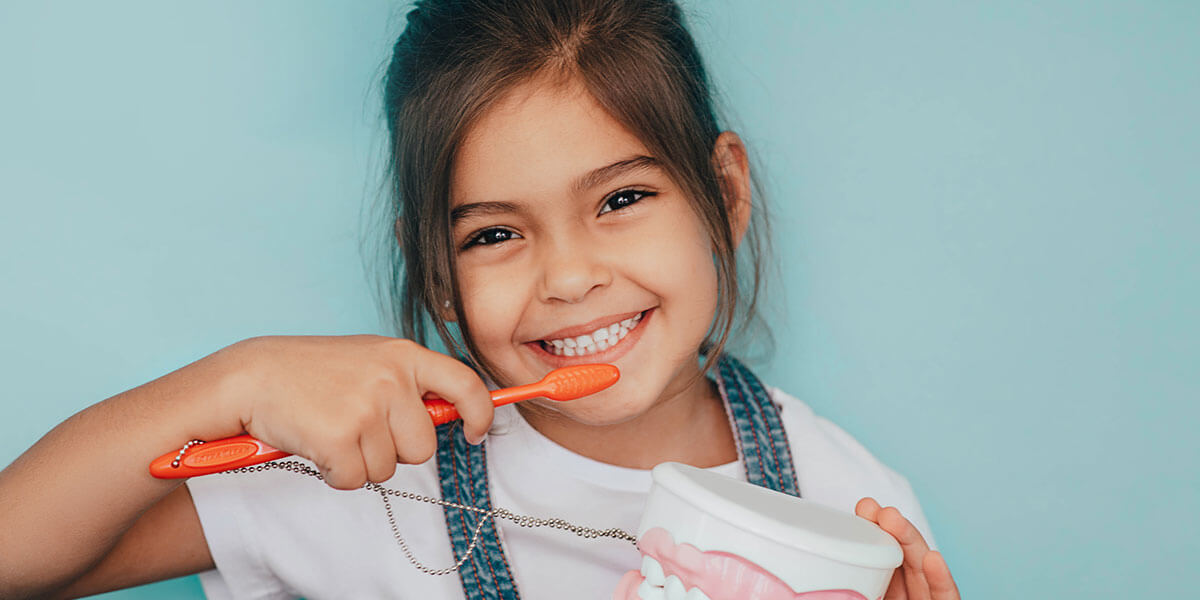Children and the Dentist

At what age should I take my child to see Dr. Trombetta?
According to the American Academy of Pediatric Dentistry, a child should see the dentist for the first time by age one or within six months after the first tooth erupts (when the tooth breaks through the gum tissue and becomes visible).
Why should a baby go to the dentist?
Baby teeth are important to your child's health. In addition to those cute baby smiles, baby teeth are vital to developing proper lip and tongue position and also helping your child say their first words.
Importantly, the baby teeth are space holders for permanent teeth that are growing in the gums underneath the baby teeth. If a baby tooth is lost too soon, the nearby teeth will drift into the empty space and prevent the permanent teeth from erupting. Finally, teaching your child to take care of their teeth will create early healthy habits that will serve them for life.
What happens at the first visit?
The first visit is designed to make children comfortable in the dental chair and to teach parents how to care for their child's baby teeth. Dr. Trombetta will gently look inside the child's mouth to count the teeth and view the health of the gums. This is a good time to discuss bottle feeding and what the child is drinking in addition to milk or formula. Once the child moves to drinking from a cup, the parents must make certain to brush their teeth twice a day. After turning 2, they can begin regular visits to the dentist every six months.
Why are regular checkups necessary?
Regular checkups ensure the child learns the importance of regular brushing and daily flossing. The goal is prevention of tooth decay and to monitor the eruption of baby teeth. Other dental issues that Dr. Trombetta can evaluate and educate about include teething, pacifier habits, finger sucking habits and tongue thrusting. By age four, the child with bad habits can be taught to overcome them.
By age seven...
By age seven, the baby teeth may have begun to fall out as the adult teeth start to come in and push out the baby teeth. Your child’s first permanent molars typically erupt around age 6-7. Molars have many grooves and crevices in which food and bacteria can get caught and cause cavities. In response to that risk, Dr. Trombetta may recommend that your child receive sealants on the chewing surfaces of the permanent teeth to prevent cavities from forming.
An orthodontic evaluation at age 7 may also be important to evaluate malocclusion, proper jaw alignment, proper jaw growth and other skeletal issues that benefit being corrected at an early age. Early orthodontic intervention is crucial for jaw health and proper occlusion and as an added bonus, can also decrease the time spent in braces as teenagers. Additionally, by doing early intervention orthodontics, a child may prevent the need for painful and expensive jaw surgery as they get older.
By age 7, children should know how to properly brush their own teeth. At Marana Dental, our dental hygienists can help by working with your child to educate them on the different ways to keep their teeth and gums clean and healthy. This is also the age where the child should learn the connection between their diet and their oral health.
Help you children develop healthy habits at Marana Dental Care in Marana, Arizona
Resources
- https://www.checkupnewsroom.com/5-reasons-why-baby-teeth-are-just-as-important-as-permanent-teeth/
- https://www.webmd.com/oral-health/features/when-should-i-take-my-child-to-the-dentist
